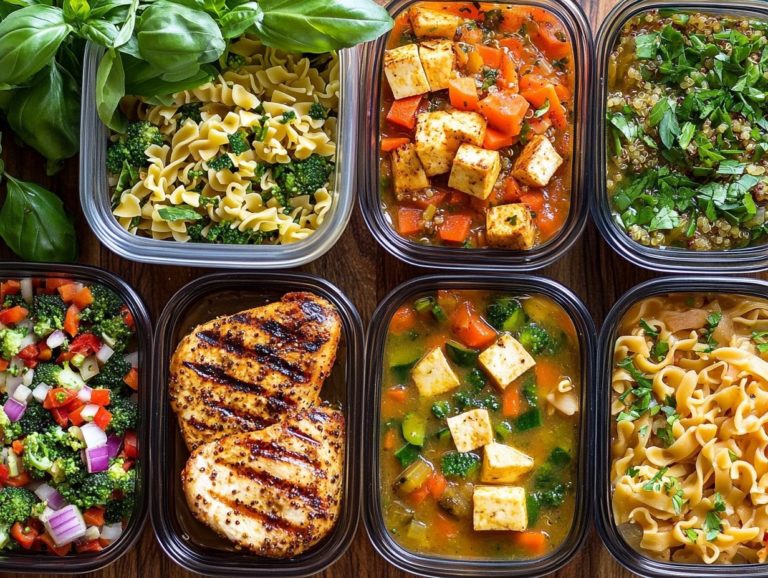How to Overcome Meal Planning Challenges
Meal planning can truly transform your journey toward healthier eating, time efficiency, and budget adherence.
You might encounter familiar hurdles such as tight schedules, financial constraints, and specific dietary restrictions. This article delves into the essence of meal planning, the challenges it entails, and provides you with practical tips to navigate these obstacles.
You’ll uncover effective strategies like meal prep, budget-friendly options, and ways to tailor plans to suit your unique dietary needs. Get ready to discover how to streamline your mealtimes and stay inspired with a successful meal planning approach!
Contents
- Key Takeaways:
- Understanding Meal Planning
- Common Challenges with Meal Planning
- Staying Motivated and Consistent with Meal Planning
- Frequently Asked Questions
- What are some common challenges people face when trying to meal plan?
- How can I make time for meal planning?
- What can I do if I have limited cooking skills?
- How can I accommodate picky eaters in my meal planning?
- What are some budget-friendly meal planning tips?
- What can I do if I have a busy schedule but still want to meal plan?
Key Takeaways:

- Plan ahead and meal prep to save time and avoid last-minute stress.
- Stick to a budget by using budget-friendly ingredients and shopping with a list.
- Adapt your plan for dietary restrictions by researching recipes and finding alternative ingredients.
Understanding Meal Planning
Grasping the art of meal planning is essential for achieving nutritional wellness and cultivating healthier eating habits. It involves the thoughtful organization of meals and snacks tailored to your individual dietary needs.
Highlighting the significance of whole grains, lean proteins, and a colorful array of fruits and vegetables is crucial. By focusing on carbohydrates, proteins, and fats, you can effectively tackle dietary challenges.
Collaborating with healthcare professionals for personalized insights can elevate your meal planning efforts, guiding you toward better food choices and a more vibrant, healthy lifestyle.
What is Meal Planning?
Meal planning is your ticket to organizing meals in advance, promoting healthy eating, and achieving nutritional balance. This practice simplifies grocery shopping and enables you to make mindful food choices catered to your dietary needs.
By crafting personalized meal plans, you can easily incorporate a diverse array of nutritious recipes that align with your preferences and seasonal ingredients. This thoughtful strategy encourages the use of whole foods and reduces food waste.
Plus, meal planning can significantly reduce the stress of daily cooking, leaving you with more quality time to savor meals with family or friends.
Common Challenges with Meal Planning
Meal planning can be challenging and may hinder you from reaching your nutritional goals. Whether it’s navigating dietary restrictions, managing a hectic schedule, or working within a tight budget, these obstacles can feel daunting. Learning how to plan meals around your schedule can make the process much easier.
Lack of Time
One of the most significant barriers to effective meal planning is often a lack of time, which can lead you to rely on processed foods. To conquer this challenge, implementing the best practices for weekly meal planning and time management strategies can be tremendously beneficial.
For instance, consider preparing large amounts of food at once. This method allows you to enjoy healthy options throughout your week.
Having a repertoire of quick meal solutions, like stir-fries or sheet pan dinners, can save you precious minutes on busy nights.
Set aside specific days for meal prep. Organize your grocery list to save time! This will ensure that nutritious meals are always within reach without the stress of daily decision-making.
Limited Budget
Limited budgets can make meal planning feel overwhelming, but with the right strategies, you can create budget-friendly meal plans that are both nutritious and satisfying.
By focusing on seasonal produce and affordable staples like beans, rice, and whole grains, you can stretch your dollar further while ensuring essential nutrients for your body.
Incorporating meal prepping into your weekly routine not only saves you time but also minimizes food waste, making your efforts even more cost-effective.
Exploring simple yet hearty recipes can uncover a treasure trove of delicious options that won’t break the bank. With a dash of creativity, you can savor a variety of flavors without compromising your health or taste.
Dietary Restrictions or Preferences

Dietary restrictions or preferences can complicate meal planning. Finding personalized meal plans that cater to your needs is essential.
By understanding your unique requirements, you can choose foods more easily. This ensures that your meals are both nutritious and enjoyable.
Whether you’re managing allergies, adhering to specific diets for health conditions, or simply seeking healthier options, adapting your meals accordingly is crucial.
Consulting healthcare professionals, like registered dietitians, can offer expert guidance tailored to your personal health goals.
Collaborating with them helps create a flexible meal plan that accommodates your dietary restrictions while promoting overall well-being. This approach leads to a more sustainable and satisfying eating experience.
Tips for Overcoming Meal Planning Challenges
Don’t let meal planning stress you out! With a few smart strategies, you can discover how to plan meals for a busy week and make it enjoyable and fulfilling.
Embrace effective meal prep techniques and seek out community support to enhance your experience.
Meal Prep and Batch Cooking
Meal prep and batch cooking are exceptional strategies that save you time and make cooking fun. They ensure you always have nutritious recipes at your fingertips.
These methods streamline your cooking process, transforming it from a daunting task into an enjoyable endeavor. By dedicating just a few hours each week to prepare meals in advance, you can effortlessly eliminate the daily struggle of deciding what to eat.
Consider investing in high-quality storage containers to keep your prepped meals fresh and organized.
For instance, cooking grains, proteins, and vegetables in bulk provides a versatile foundation for an array of dishes throughout the week. This allows you to unleash your culinary creativity without the stress.
Label each container with dates to easily track freshness, guaranteeing that your meals remain not only delicious but also safe to enjoy.
Budget-Friendly Meal Planning
Budget-friendly meal planning is all about choosing nutritious recipes that enhance your health while keeping costs low. This ultimately makes grocery shopping easier and less stressful.
By prioritizing seasonal produce, you can significantly lower your grocery bills while savoring fresh, vibrant flavors. Opting for bulk purchases of grains and legumes not only helps your budget stretch further but also adds essential nutrients to every meal.
Incorporating more plant-based proteins into your diet offers both financial savings and health advantages, as these options are generally more affordable than their animal-based counterparts.
Strategically planning your recipes around pantry staples allows you to create meals that are not only economical but also nutritious. This cultivates a sustainable approach to eating well without straining your finances.
Adapting for Dietary Needs
Adapting meal plans to suit your specific dietary needs is essential for achieving your nutritional goals without sacrificing flavor. To start this journey, identify any dietary restrictions or preferences you may have, such as allergies, intolerances, or lifestyle choices like vegetarianism or veganism.
Engaging with healthcare professionals, like registered dietitians or nutritionists, provides you with valuable insights and personalized advice. These experts assist in crafting meal plans that align with health guidelines while incorporating your favorite foods. This makes the path to healthier eating both enjoyable and sustainable.
By incorporating a diverse range of foods while maintaining nutritional balance, you significantly increase the chances of sticking to your meal plan.
Creating a Successful Meal Plan
Crafting a successful meal plan demands a meticulous approach, one that harmonizes nutrition, caloric intake, and your personal food preferences.
It s essential to weave in a diverse array of nutritious recipes, ensuring that every meal not only satisfies your palate but also nourishes your body effectively.
Factors to Consider

When crafting a successful meal plan, consider your dietary needs, caloric intake, and lifestyle preferences. Align these factors with your nutritional goals to ensure balanced meals packed with essential vitamins and minerals.
Food availability also plays a crucial role. Access to fresh produce and quality proteins can significantly influence your meal choices.
Consulting with healthcare professionals provides valuable insights tailored to your unique health conditions or dietary restrictions, enhancing your meal plan’s effectiveness.
This exciting approach helps you create sustainable habits while enjoying a varied and nourishing diet.
Sample Meal Planning Template
A well-crafted meal planning template can be invaluable for anyone looking to organize their meals with precision and flair.
Using such a template streamlines grocery shopping, ensures a balanced array of nutrients, and accommodates specific dietary preferences. Picture sections for breakfast, lunch, dinner, and snacks, inviting you to jot down delicious recipes that align with your health goals.
You can tailor each day s meals to your liking, including options for vegetarian dishes, gluten-free choices, or high-protein selections, making it easy to meet your dietary needs.
Keeping track of ingredients helps you make smarter shopping decisions, minimizing food waste while enhancing your overall well-being.
Staying Motivated and Consistent with Meal Planning
Maintaining motivation and consistency in meal planning is crucial for your long-term success in achieving healthy eating habits. Committing to this practice sets the stage for transformative changes that benefit both your body and mind.
Setting Realistic Goals
Setting realistic goals is essential for effective meal planning. This allows you to align your expectations with dietary challenges and lifestyle.
Break larger aspirations into smaller, manageable steps to navigate nutritional choices without feeling overwhelmed. Emphasizing gradual change fosters a sense of accomplishment and encourages commitment to your dietary journey.
Incorporating a variety of foods, monitoring portion sizes, and listening to your body’s hunger signals are vital. To enhance your meal planning experience, consider meal planning tips for busy families by establishing specific criteria for success, like cooking a new recipe each week or planning meals in advance.
Finding Accountability and Support
Finding accountability and support is essential for maintaining motivation and consistency in meal planning, especially when navigating dietary challenges. Joining community support networks can boost your meal planning success.
This could mean attending local workshops, participating in online forums, or connecting with friends who share similar health goals. Healthcare professionals offer tailored advice and encouragement to stay on track.
Combining professional guidance with the camaraderie found in supportive communities creates a well-rounded approach to overcoming dietary hurdles and fostering lasting lifestyle changes.
Frequently Asked Questions
What are some common challenges people face when trying to meal plan?

Common challenges in meal planning include lack of time, cooking skills, picky eaters, and limited budgets, but learning the best meal planning strategies for beginners can help overcome these hurdles.
How can I make time for meal planning?
To make time for meal planning, set aside a specific day and time each week to plan your meals. This could be during the weekend or a slow weekday evening. Meal prepping can also save time during the week.
Start your meal planning today for a healthier you!
What can I do if I have limited cooking skills?
If you have limited cooking skills, start with simple recipes. Watching cooking tutorials can also help you improve.
How can I accommodate picky eaters in my meal planning?
Involve picky eaters in the meal planning process. Ask for their input and find creative ways to include their preferences.
What are some budget-friendly meal planning tips?
Want to save money on meals? Buy in bulk and plan around sales. Use cheaper protein sources like beans and lentils, and include more plant-based meals.
What can I do if I have a busy schedule but still want to meal plan?
If you’re busy, consider meal delivery services that bring ready-to-cook meals to your door. Incorporate quick meals like sheet pan dinners or slow cooker recipes to save time.






